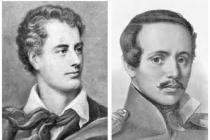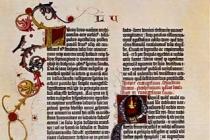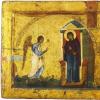M. Yu. Lermontov is a representative of romanticism. He was fond of the works of the English romantic J. Byron. This is reflected in the poem described in the article. They study it in 10th grade. We invite you to read a brief analysis of “No, I’m not Byron, I’m different” according to plan.
Brief Analysis
History of creation– the poet wrote the work on the eve of his 18th birthday in 1832; it was first published in the magazine “Library for Reading” in 1845.
Theme of the poem- the fate of the wanderer's soul.
Composition– The poem is written in the form of a monologue of the lyrical hero, which can be divided into parts: comparison with Byron, the story of the lyrical hero about his soul. The work is not divided into stanzas.
Genre– an elegy with elements of a message.
Poetic size– iambic tetrameter, the cross rhyme scheme ABAB is used in the poem.
Metaphors – “a wanderer driven by the world”, “my mind will accomplish little”, “in my soul... the burden of broken hopes lies”, “a gloomy ocean”.
Epithets – “unknown chosen one”, “Russian soul”.
Comparisons- “in my soul as in the ocean.”
History of creation
M. Yu. Lermontov wrote the analyzed poem in 1832, shortly before he turned 18 years old. Even then, the young man knew that he would devote his life to literature. Mikhail Yuryevich created his early poems in the spirit of romanticism and did not change this direction until the end of his creative career. It is not surprising that the young poet compared himself to Byron.
Lermontov was interested in the work of the English romantic poet since childhood. He reread not only Byron's works, but also his biography. At a young age, Mikhail Yuryevich noticed that he and his idol had a lot in common both in fate and in character. Byron was considered a gloomy and touchy person with whom it was very difficult to find a common language. Lermontov also felt that those around him did not understand him, so he often closed in on himself.
Before writing the poem, the Russian poet managed to survive the death of his mother and separation from his father. His dream of becoming a philologist was also dashed. We find hints of these events in his work.
The poem “No, I’m not Byron, I’m different” is considered prophetic, because in it the poet predicted that his life would be short. The work was first published in the magazine “Library for Reading” in 1845.
Subject
The analyzed poem can be considered programmatic, because it reflects the features of romanticism. In its lines, the poet talks about the fate of the wanderer’s soul. At the center of the work is a lyrical hero who is trying to know himself and predict the future. The lyrical “I” completely merges with the author.
In the first lines, the hero confidently declares that he is not Byron. However, he does not hide the fact that he considers himself the chosen one. The young man does not deny some similarities with the English poet, believing that both of them are wanderers “persecuted by the world.” This metaphor hints not only at alienation from the crowd, unable to understand the rebellious soul, but also at Lermontov’s wanderings associated with his service. The lyrical hero calls himself a wanderer. This perception of a lonely rebellious soul is characteristic of romanticism.
The hero says that he turned to creativity before Byron, so he considers it natural to “finish the wound.” He allows himself to lift the curtain of his soul. The reader can see that in it “the cargo of broken hopes lies.” The lyrical hero carefully hides his thoughts from the crowd, realizing that he will find only misunderstanding and condemnation in them. His thoughts are known so far only to himself and God.
Composition
The poem is written in the form of a monologue of the lyrical hero, which can be divided into parts: a comparison with Byron, the story of the lyrical hero about his soul. However, thoughts smoothly flow from one to another, so the work is not formally divided into stanzas.
Genre
The genre is elegy, as philosophical motifs predominate in the poem. Talking about his fate, the lyrical hero does not hide his sadness. The poems are written in iambic tetrameter. The author used cross rhyme ABAB. The text contains both masculine and feminine rhymes.
Means of expression
M. Lermontov reproduced his thoughts about his fate and the fate of Byron using artistic means. The trails allowed the author to explore the topic expressively and originally.
The text is dominated by metaphors: “a wanderer driven by the world”, “my mind will accomplish a little”, “in my soul... the burden of broken hopes lies”, “a gloomy ocean”. The monologue is complemented epithets- “unknown chosen one”, “Russian soul” and comparison- “in my soul, like in the ocean.”
Intonation plays an important role in the work. With the help of interrogative and exclamatory sentences, the poet places semantic accents
The rebellious spirit of the lyrical hero is conveyed through alliteration“r”: “like him, a wanderer persecuted by the world, but only with a Russian soul.”
Poem test
Rating Analysis
Average rating: 4.2. Total ratings received: 25.
Mikhail Yurjevich Lermontov
No, I'm not Byron, I'm different
A still unknown chosen one,
Like him, a wanderer driven by the world,
But only with a Russian soul.
I started earlier, I will finish earlier,
My mind will accomplish a little;
In my soul, like in the ocean,
The hope of the broken cargo lies.
Who can, the gloomy ocean,
Shall I discover your secrets? Who
Will he tell the crowd my thoughts?
I am either God or no one!

Mikhail Lermontov realized very early that his life would be connected with literature, although he never considered himself an outstanding poet. However, in 1832, shortly before his 18th birthday, he wrote the poem “No, I’m not Byron, I’m different...”, in which he predetermined his life and creative path.
Mikhail Lermontov was interested in the works of the English poet George Gordon Byron from early childhood. He was well aware of the fate of this gloomy and very touchy man, who was never understood by his contemporaries. Lermontov feels that the same fate awaits him, and he also has to become a wanderer who is “persecuted by the world” and deprived of public recognition. The author of this poem denies that in his work he imitates the famous Englishman, since his soul is not yet poisoned by sarcasm. However, Lermontov still admits that he has quite a lot in common with Byron. And, first of all, this is a unique ability to get ahead of time and events, as well as the gift of foresight, which Lermontov discovered in himself while still a teenager.
In this work, he directly indicates that his life's journey will be short-lived. “I started earlier, I will finish earlier,” the poet notes, thereby predetermining his own fate. Touching on the topic of creative heritage, Lermontov emphasizes: “My mind will accomplish a little.” At the same time, the author notes that even now, at such a young age, his soul bears the burden of unfulfilled hopes, which he will have to put up with for the rest of his life. Possessing the gift of a prophet, Lermontov understands perfectly well that he was born at the wrong time. Therefore, in order to reach the hearts of even those close to him, great efforts should be made. The poet understands that if he does not do this, then, except for God, no one else is able to convey to those around him the feelings and thoughts, to give them a correct definition. And it is precisely the need to turn his own soul inside out that frightens the young poet, who prefers to follow Byron’s path just so as not to experience suffering and humiliation.
Drawing an analogy with the life of his English idol, Lermontov understands that he will also be doomed to loneliness. However, this does not bother the author at all, for whom it is much sadder to realize the fact that all his efforts to change the world for the better will run into a blank wall of misunderstanding. And, perhaps, decades later they will be appreciated by other generations, but the poet will no longer be able to enjoy his own triumph.
Reading the poem “No, I’m not Byron, I’m different...” by Mikhail Yuryevich Lermontov is offered to schoolchildren at a literature lesson in high school. First, teachers analyze it together with the children, and then assign it to them to study at home. On our website, the entire verse can be read online. In addition, if you wish, you can download it for free to your tablet, computer or phone.
The text of Lermontov’s poem “No, I’m not Byron, I’m different...” was written by Mikhail Yuryevich at the age of 17. Theme of the work: poet and society. In the poem, the author compares himself with the English poet Byron. At first Lermontov denies his resemblance to him, writing that he is different. However, after just two lines, we see that there is still something in common between them. Lermontov says that no one understands him, just like George Gordon, and is unlikely to be able to understand. Then Mikhail Yurievich Lermntov writes that he began to create early and will finish early. He says that his mind can do little. Also in the work, he writes that in his soul lies a burden of empty hopes. The author acts as a prophet in this poem. He really didn’t live long (only 26 years), and was often misunderstood by those around him.
"No, I'm not Byron, I'm different..." "NO, I'M NOT BYRON, I'M DIFFERENT...", poem. early L. (1832). The usual comparison for L. of his fate with the fate of the English. poet [cf. “K***” (“Don’t think that I’m worthy of pity”), autobiographical. note 1830: “Another similarity in my life with Lord Byron”, VI, 387 - see Autobiographical Notes] in this verse. significantly clarified, which indicates his poetic. and spiritual self-determination. L. does not reject internal kinship with B. - both poets appear in verse. how romantic wanderers experiencing a conflict with the crowd and with the whole world, to which they are alien and to which they are “persecuted.” L. is also united with J. Byron by the position of chosenness - with the difference, however, significant for L. that he, unlike the English. poet, still “unknown” to the world: “unknown chosen one.” This, therefore, is not about the rejection of Byronism, seemingly stated in the first line, but about the special and more tragic personal fate of the poet “with a Russian soul” (“I began earlier, I will finish sooner, / My mind will not accomplish much”). . The comparison is, therefore, based on two chapters. lines - internal correlation with the personality of Byron and the opposition of his poetic. “destiny”, and the development, the result of both hypostases seem to L. joyless. The definition “with a Russian soul” indicates the awakening of the national. self-awareness and on different societies. conditions in which both poets worked. The lines: “In my soul, like in the ocean, / The cargo of broken hopes lies...” can be read both as an expression of personal and historically conditioned (as if “inherited”) tragedy, burdened by the consciousness of the unspokenness of one’s lofty and secret thoughts. Comparing his soul with the ocean reveals the scale of these unknown thoughts of the poet, but at the same time doubt in the very possibility of expressing them, for the complexity of the task requires efforts equal to the power of “god”. The pathos of the indispensability of one's humanity and poetry. callings are emphasized in the last lines by the prominence of the word “who” in rhyme and the last verse: “... who / Will tell my thoughts to the crowd? / I am either God or no one!” Composite structure of verse. returns to the motive of chosenness. Autograph unknown Copy - IRLI, notebook. XX. For the first time - "BdCh", 1845, vol. 68, No. 1, dep. 1, p. 12. Dated according to position in the notebook.
Lit.: Block A., Collection. soch., t. 11, L., 1934, p. 406; Ginsburg(1), p. 67; Durylin(5), p. 171-72; Nolman, With. 473-74; Fedorov(2), p. 314-15; Fabian E., Von Puschkin bis Gorki. Neun russische Dichter, Schwerin, , S. 52-53; Giusti W., Il demone e l\"angelo. Lermontove la Russia del suo tempo, Messina - Firenze, , pp. 157-58.
V. I. Korovin Lermontov Encyclopedia / USSR Academy of Sciences. Institute rus. lit. (Pushkin. House); Scientific-ed. Council of the publishing house "Sov. Encycl."; Ch. ed. Manuilov V. A., Editorial Board: Andronikov I. L., Bazanov V. G., Bushmin A. S., Vatsuro V. E., Zhdanov V. V., Khrapchenko M. B. - M.: Sov. Encycl., 1981
See what “No, I’m not Byron, I’m different...” in other dictionaries:
From an untitled poem (1832, published 1845) by M. Yu. Lermontov (1814 1841): No, I’m not Byron, I’m different, Another unknown chosen one Like him, a wanderer persecuted by the world, But only with a Russian soul. Used: as a playfully ironic... ... Dictionary of popular words and expressions
TRANSLATIONS AND STUDY OF LERMONTOV IN THE LITERATURES OF THE PEOPLES OF THE USSR. The connections between L.’s creativity and the literatures of the peoples of the USSR are numerous and diverse, they were implemented in different ways and were realized in individual literatures, and arose at different times depending on... ... Lermontov Encyclopedia
BYRON George Gordon Noel (1788 1824), English. romantic poet. The participant will revolutionarily liberate. movements in Italy and Greece. He expressed the mood of the era of the collapse of enlightenment ideals. The combination of sorrow, irony and the will to fight in his poetry... Lermontov Encyclopedia
The name of the English poet is associated with the literary public mood known under the name of Byronism, which was the result of the impression made on the whole of educated Europe by both the brilliant works of Byron and the peculiar... ... Encyclopedic Dictionary F.A. Brockhaus and I.A. Efron
"Lermontov" request is redirected here; see also other meanings. Mikhail Yuryevich Lermontov ... Wikipedia
This term has other meanings, see Brother. Brother 2 Genre Fighting ... Wikipedia
This term has other meanings, see Airship (meanings). Airship “Napoleon rises from the grave”, (painting by Horace Vernet, 1860) Genre: ballad ... Wikipedia
ENGLISH LITERATURE gained popularity in Russia in the 18th century, but to a lesser extent than French and German literature. English language was also less common in the Russian educated world; rus. readers and translators often became acquainted with the works ... Lermontov Encyclopedia
A, m. 1. A person chosen by someone, preferred by another. Yegor Pavlovich told her to choose some face in the public that she liked, and then play for that face: I always played for someone and thought that my chosen one... ... Small academic dictionary
The style of this article is non-encyclopedic or violates the norms of the Russian language. The article should be corrected according to the stylistic rules of Wikipedia... Wikipedia
Books
- Russian classics. The best. Part 7 (5CDmp3), . Pushkin A. S. “Boris Godunov” “Radio play” Performed by B. Dobronravov. P. Masalsky, M. Yanshin. “For the sixth year now I have been reigning peacefully, but there is no happiness for my soul?” Boris Godunov laments,…
No, I'm not Byron, I'm different
An unknown chosen one
Like him, a wanderer driven by the world,
But only with a Russian soul.
I started earlier, I will finish earlier,
My mind will accomplish a little;
In my soul, like in the ocean,
The hope of the broken cargo lies.
Who can, the gloomy ocean,
Shall I discover your secrets? Who
Will he tell the crowd my thoughts?
I am either God or no one!
Analysis of the poem “No, I’m not Byron, I’m different” by Lermontov
Lermontov had great respect for the most famous romantic - Byron. In many works he unwittingly, and sometimes consciously, imitated him. Byron's difficult fate became an ideal example for romanticism. In 1832, the poet wrote the famous poem “No, I’m not Byron, I’m different...”, in which he compared his fate with the life of an outstanding Englishman.
Lermontov was only 18 years old, but he already predicted many events in his life. The poem is considered prophetic. The poet immediately declares that he is different from Byron. Most likely, he means that his fate will be even more tragic. Lermontov could not even imagine that two Caucasian exiles and rejection from the entire high society awaited him. But he already declares that he will become a “wanderer persecuted by the world.” The remark “only with a Russian soul” is important. For romanticism in general, a patriotic theme was unusual. Romantics did not accept the surrounding reality, they strived for constant changes and travel. The image of the homeland appeared only in connection with forced exile, as a contrast to a foreign land. Lermontov emphasizes that his nationality is a significant difference.
The poet says: “I started earlier, I will finish earlier.” The first collection was published when he was 18 years old. Lermontov began writing poetry at the age of 14, but the first publication appeared only in 1835. Byron died quite young, at the age of 36. Therefore, Lermontov’s statement looks extremely pessimistic. But fate was indeed more cruel to him: the poet died in a duel at the age of 26.
Lermontov was still at the beginning of his literary journey, but he had already declared: “My mind will accomplish a little.” His words were prophetic only for his contemporaries. The work of the great Russian poet was not appreciated during his lifetime. Only after his tragic death did he finally receive recognition.
Lermontov compares his inner world to a “gloomy ocean,” the mystery of which has yet to be unraveled. He feels that for the rest of his life he will face misunderstanding from the crowd. If he fails to convey his personal feelings to others, then his only hope is in God. The poet probably has in mind a posthumous study of his work. Lermontov does not exclude the possibility that he will forever take his secret to the grave (“or no one!”).
The poem is indeed prophetic in many ways. But Lermontov was wrong about the most important thing. Descendants appreciated his life and immortal creativity. The poet's works were included in the golden fund of Russian literature.














